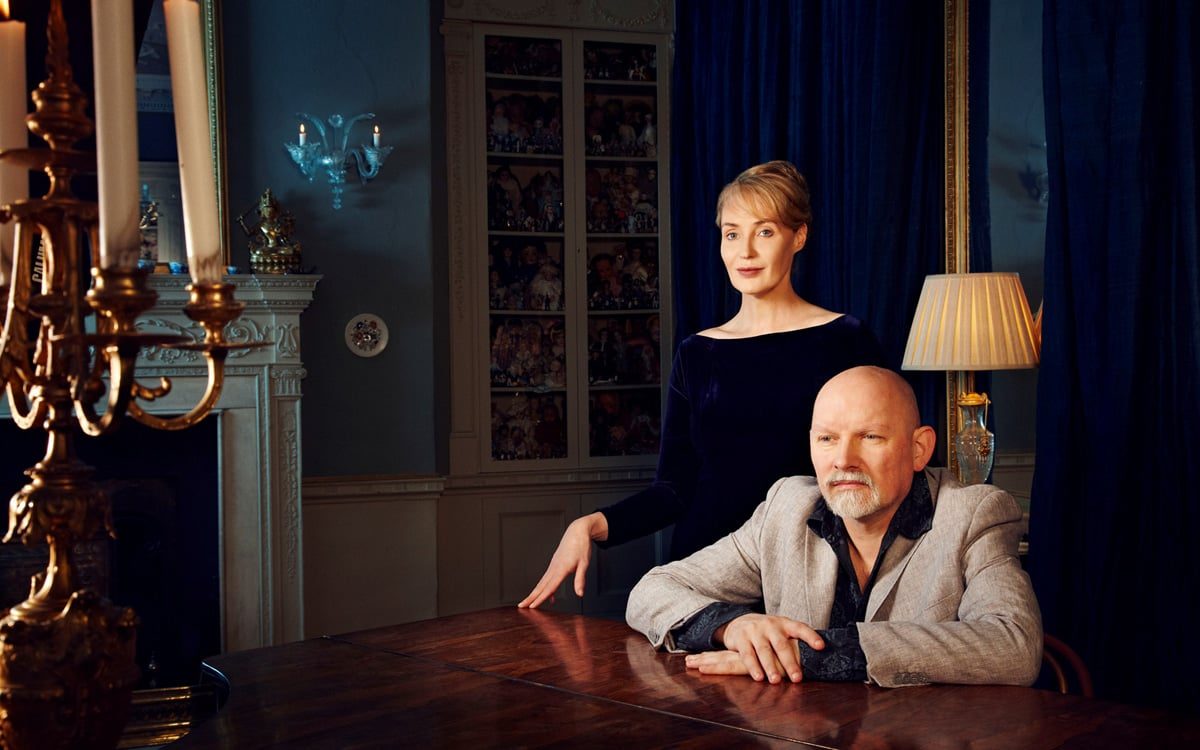The Majestic Music of Dead Can Dance

After reading that Dead Can Dance is reissuing three of their albums — 1984’s Dead Can Dance, 1985’s Spleen and Ideal, and 1993’s Into the Labyrinth — on vinyl this summer, I revisited the duo’s discography for the first time in ages. I was struck yet again by the primal-yet-artful beauty that fills Brendan Perry and Lisa Gerrard’s otherworldly music, regardless of whether they’re exploring medieval and Renaissance music or the diverse sounds of Africa and the Middle East, whether they’re employing exotic instrumentation and percussion, an orchestra, or just the sound of their own voices.
I’ve compiled a Spotify playlist of some of my favorite Dead Can Dance songs, culled from all eras in their discography, along with some thoughts on each song.
1) “The Carnival is Over”
The playlist isn’t in any particular order, but if you were to press me, I’d have to say that “The Carnival is Over” is my favorite Dead Can Dance song. While it’s a far cry from the sort of music that the duo is best known for (a goth-y fusion of medieval, orchestral, and world music), I still find it very affecting thanks to Perry’s rich voice, evocative lyrics, and the soaring synth arrangements.
2) “The Wind That Shakes the Barley”
This spellbinding performance is proof that Lisa Gerrard’s voice is one for the ages.
3) Yulunga (Spirit Dance)
One of the duo’s best “tribal” compositions. The rhythms have an uncanny way of working their way through your body; meanwhile, Gerrard’s vocals and the droning flutes and field recordings conjure all manner of hidden, exotic lands.
4) The Host of Seraphim
Even if you’re wholly unfamiliar with Dead Can Dance, I wouldn’t be surprised if you’ve heard this song before; it’s appeared on various movie soundtracks. Though Dead Can Dance aren’t a religious group, there’s undoubtedly something sacred about this song, due in large part to Gerrard’s otherworldly — angelic even — vocals.
5) Mesmerism
A lesser-known track from 1985’s Speen and Ideal that weaves together Gerrard’s dulcimer and insistent percussion — and of course, the duo’s inimitable vocals — as it builds to a gorgeous climax.
6) The Lotus Eaters
This was one of the last songs that Dead Can Dance recorded before disbanding in 1998. The hypnotic rhythms and textures, and the duo’s vocal intonations, conjure up vast Middle Eastern vistas. A nice return to form after 1996’s underwhelming Spiritchaser.
7) “Black Sun”
“Black Sun” is all about Brendan Perry’s voice. While Lisa Gerrard’s singing understandably gets the most attention, I enjoy Perry’s singing just as much. There’s a dignified roughness to it that makes whatever he sings — in this case, “Like Prometheus, we are bound, chained to this rock/Of a brave new world, our godforsaken lot” — sound like “a calm invocation of ancient knowledge” as one critic put it.
8) “Severance”
Another wonderful turn by Perry, as he muses on life’s fragility — “Overland, the winds of change consume the land/While we remain in the shadow of summers now past” — while accompanied by solemn and forlorn synthesizers. The synth melody that plays during the song’s coda always gives me chills.
9) “Rakim”
Beginning with a flurry of notes from Lisa Gerrard’s yangqin (a Chinese hammered dulcimer), “Rakim” combines many elements from the band’s palette: stirring, propulsive ethnic percussion, orchestral synths, and of course, the duo’s vocals, which blend English and glossolalia into perfection. I can only imagine how awesome it would be to experience “Rakim” live.
10) “Fortune Presents Gifts Not According to the Book”
One of Dead Can Dance’s best “philosophical” songs, in which Perry muses on the capricious and random nature of existence. The song’s lyrics can be a bit grandiloquent — e.g., “What various paths are followed in distributing honors and possessions/She gives awards to some and penitent’s cloaks to others” — but leave it to Perry’s voice to lend them some gravitas.
11) “Saltarello”
This holds the distinction of being the first Dead Can Dance song that I remember hearing; it was the opening track on the 1991 compilation A Passage in Time. With a jaunty flute melody, tambourine, and lively percussion, it’s Dead Can Dance at their Renaissance Faire best. One can practically see all of the grand lords and ladies assembling on the fairgrounds for the festivities.
12 – 13) “Anywhere out of the World” and “Enigma of the Absolute”
Although Dead Can Dance was popular in goth circles, I’d never describe them as a “goth” band. But listening to the darkly solemn and ethereal atmospheres of “Anywhere out of the World” and “Enigma of the Absolute,” I can certainly understand why some might describe them as such.
14) “Amnesia”
After a couple of reunion tours, Dead Can Dance finally released their first album in 16 years: 2012’s Anastasis. It was a solid return to form, and though more polished than, say, 1987’s Within the Realm of a Dying Sun or 1985’s Spleen and Ideal, it tapped into the same sense of grandeur on “Amnesia.”
15) “Summoning of the Muse”
As I’ve mentioned before, there’s nothing explicitly religious about Dead Can Dance’s music, but “Summoning of the Muse” almost certainly draws from some sacred music traditions. Tolling bells, Gerrard’s celestial glossolalia, cathedral-sized synthesizers — listening to these elements, which find the duo at their most bombastic and most sublime, it’s impossible not to imagine a most sacred rite being performed on holy ground.
16) “Sanvean”
Another stellar vocal performance by Lisa Gerrard. Featuring her contralto surrounded by soft, funereal synth pads, “Sanvean” — which also appeared in Gerrard’s solo debut, 1995’s The Mirror Pool (plus an episode of The West Wing, for what it’s worth) — practically drips with sorrow. Which makes sense considering that Gerrard wrote the song while away from her family back in Australia.